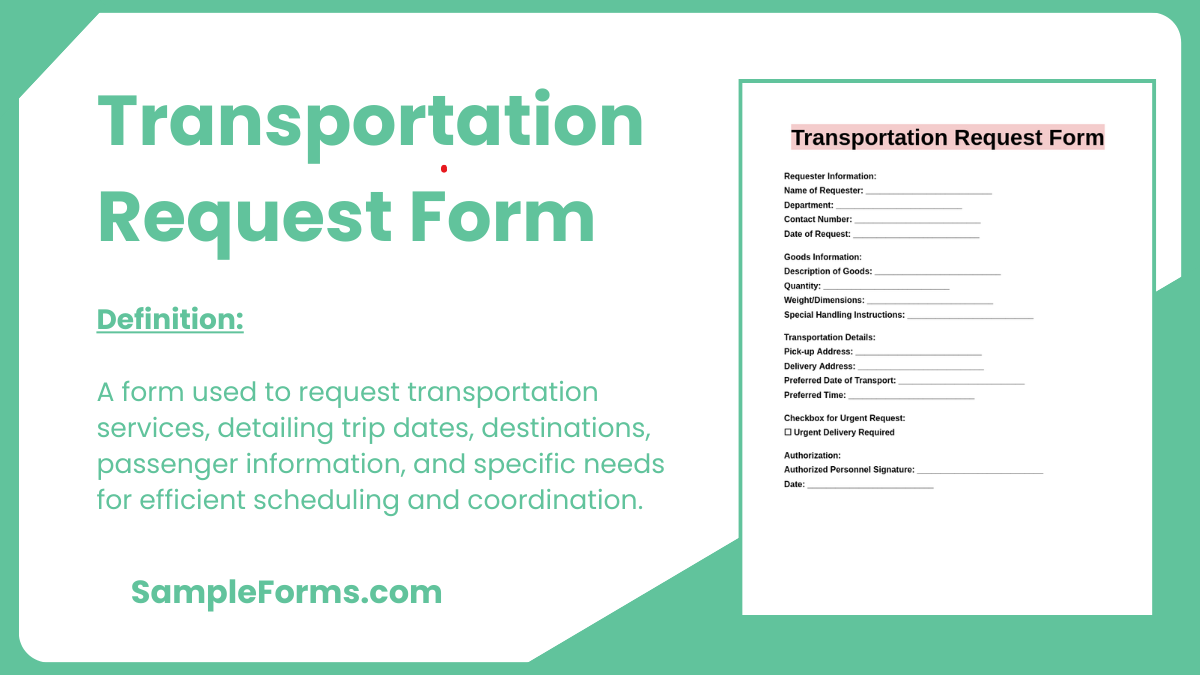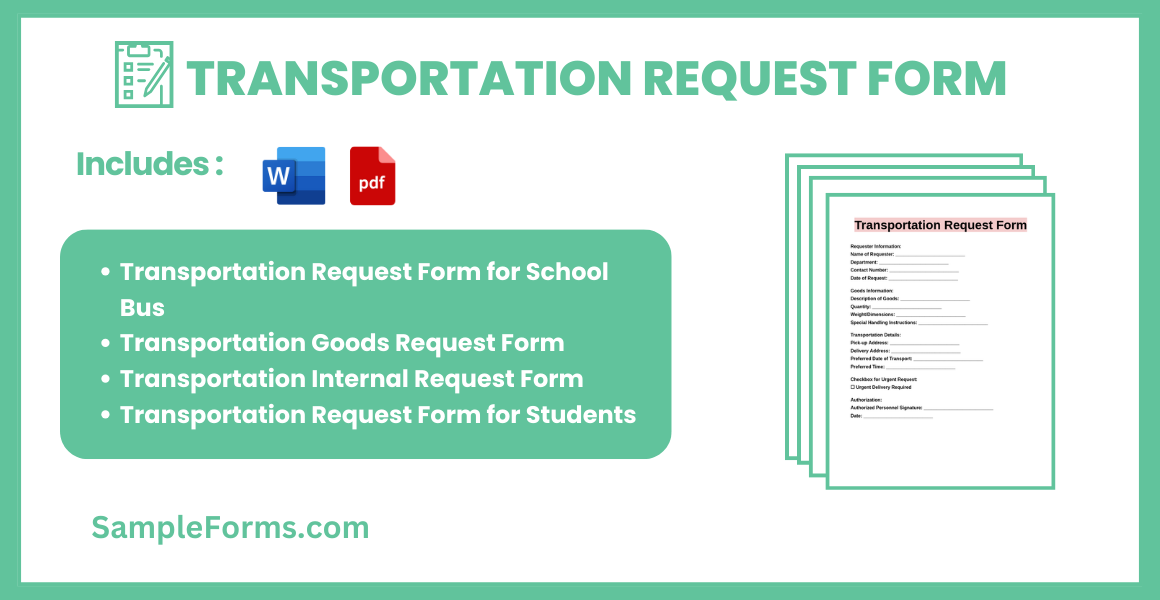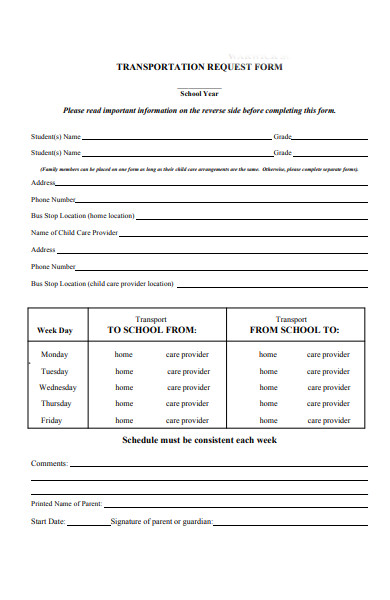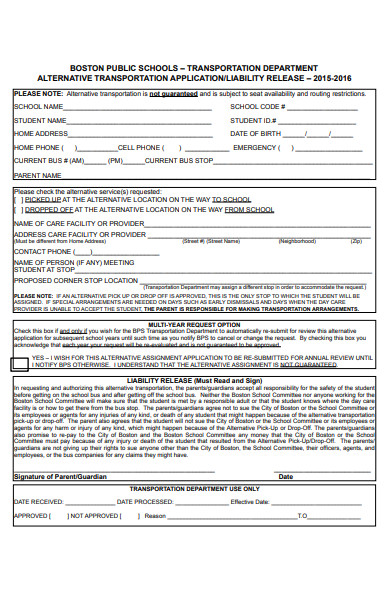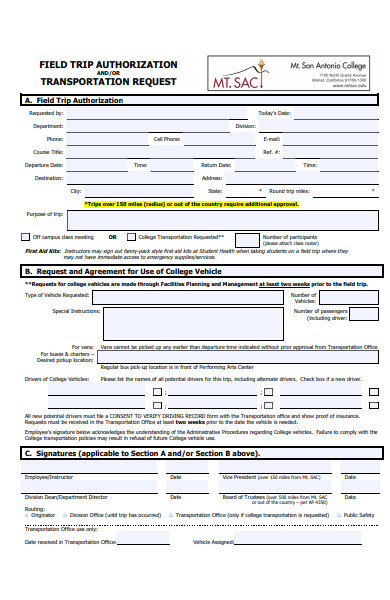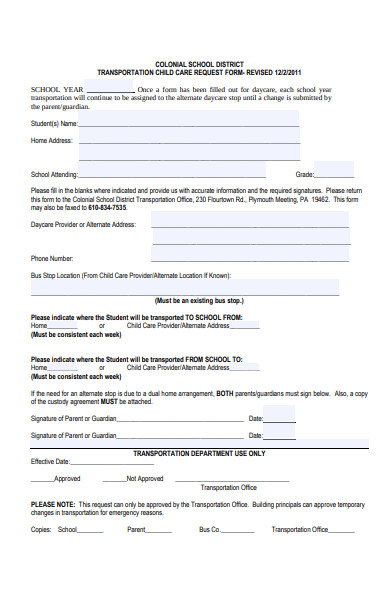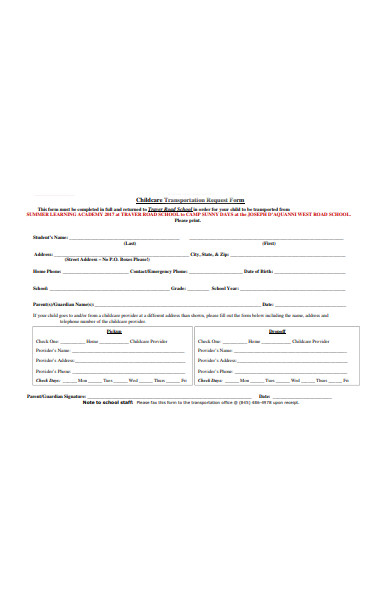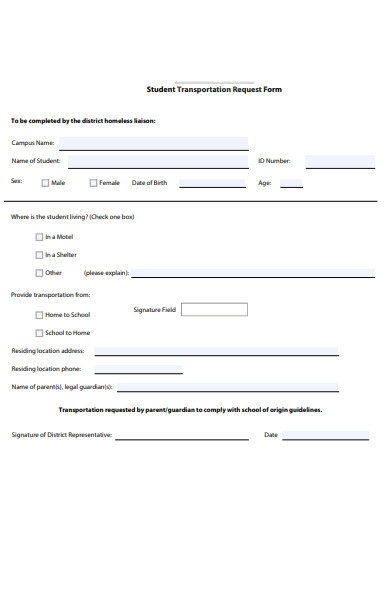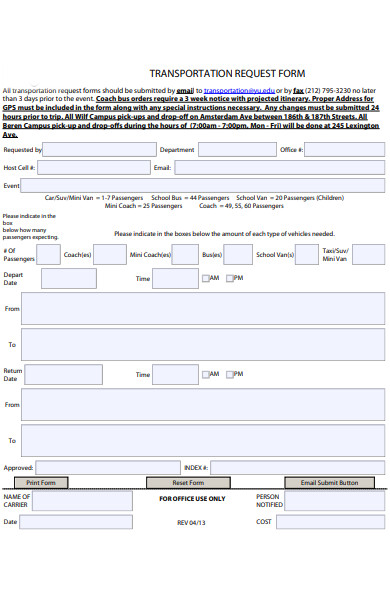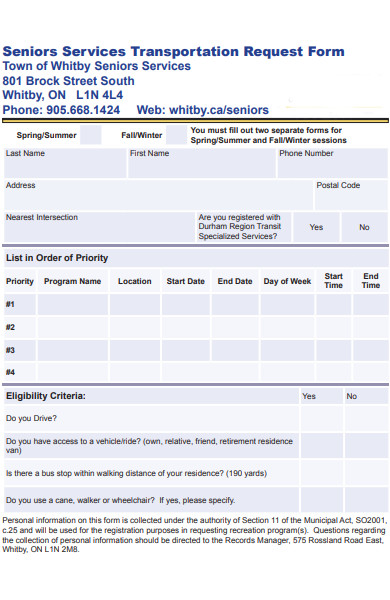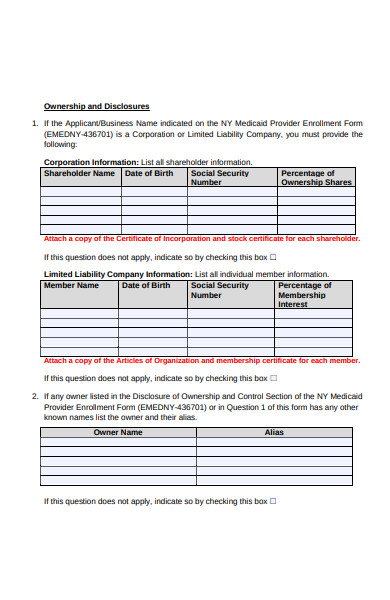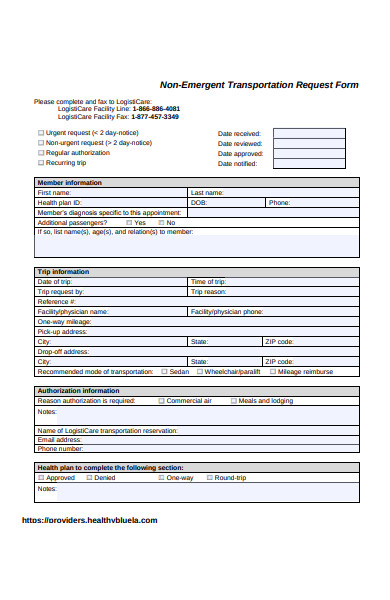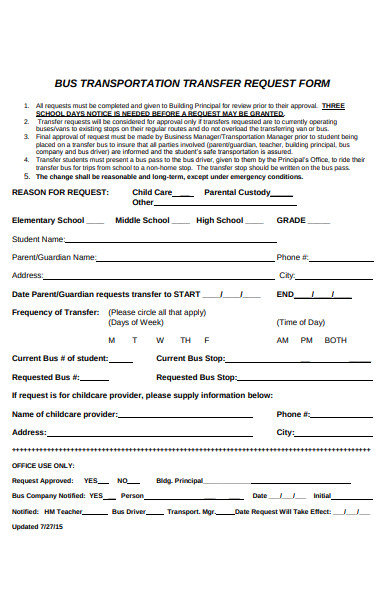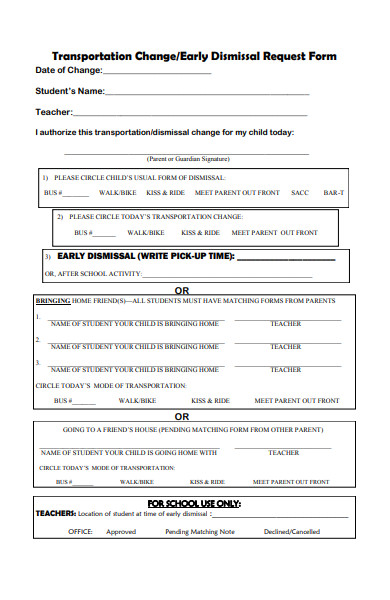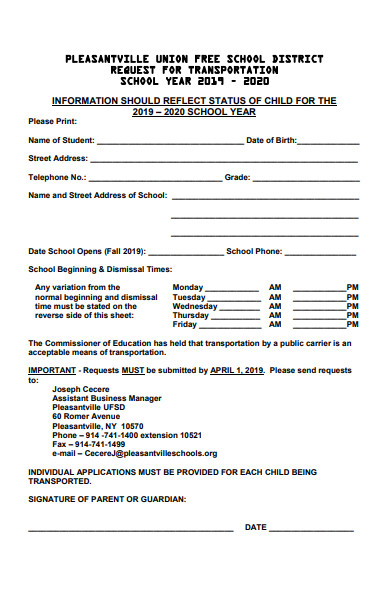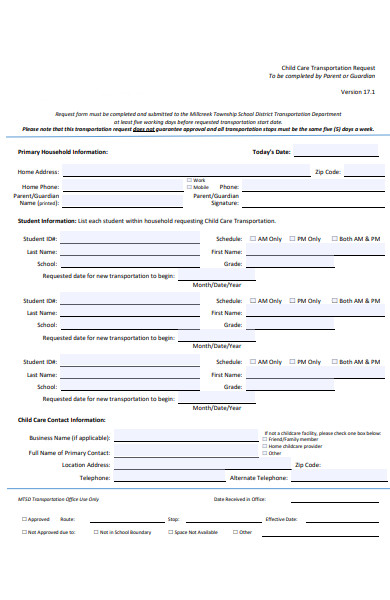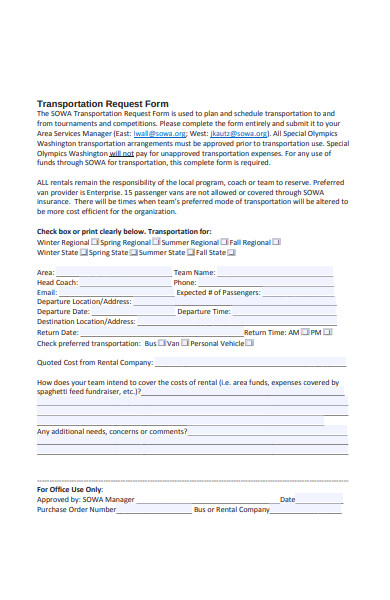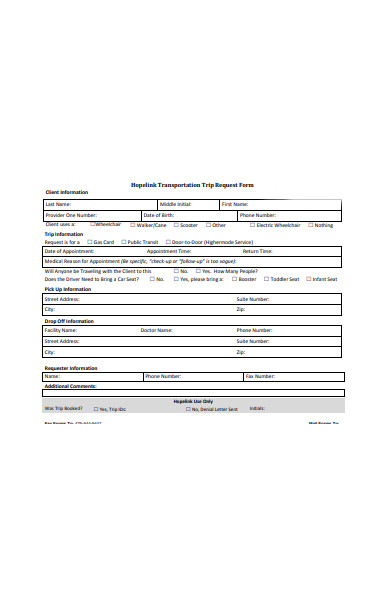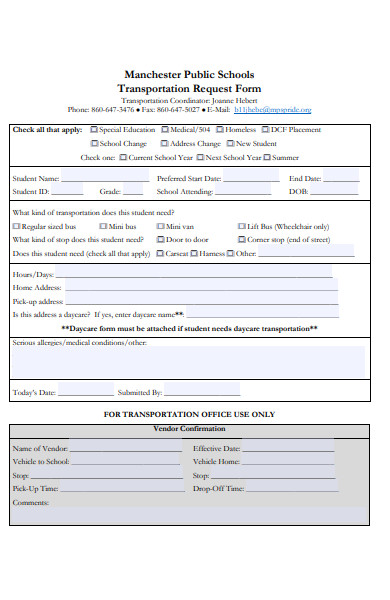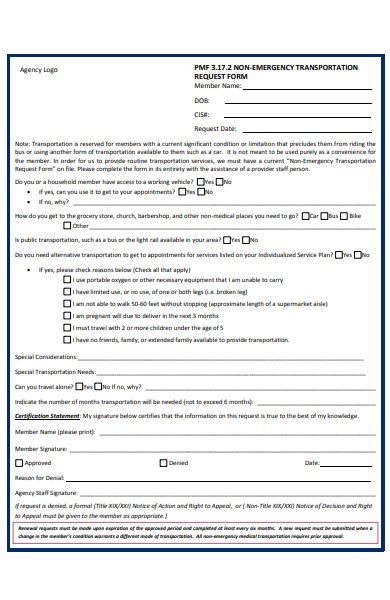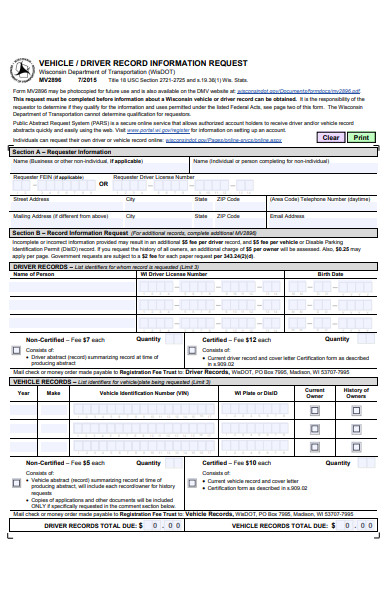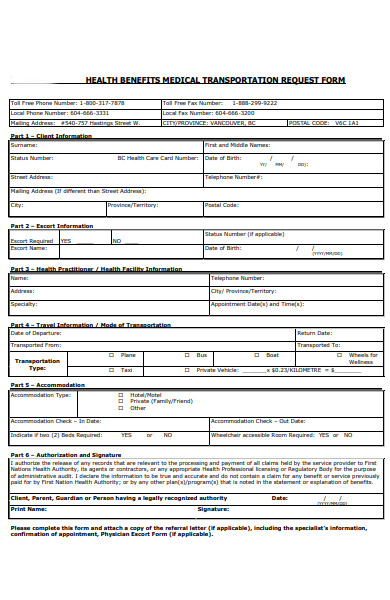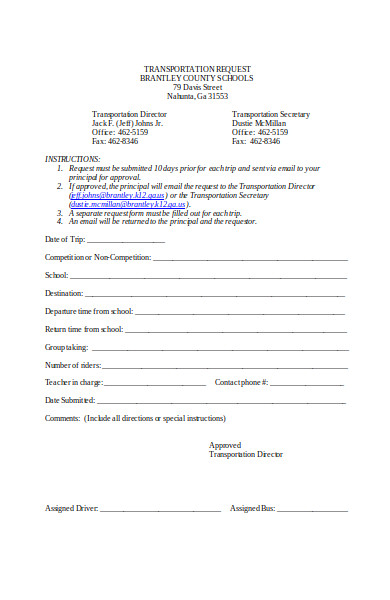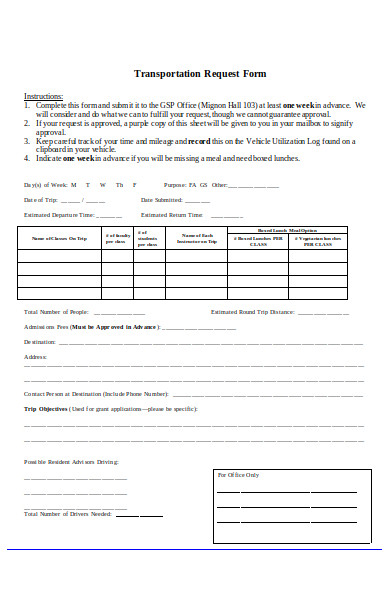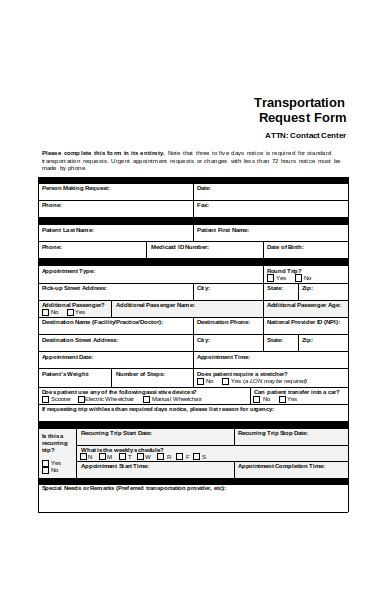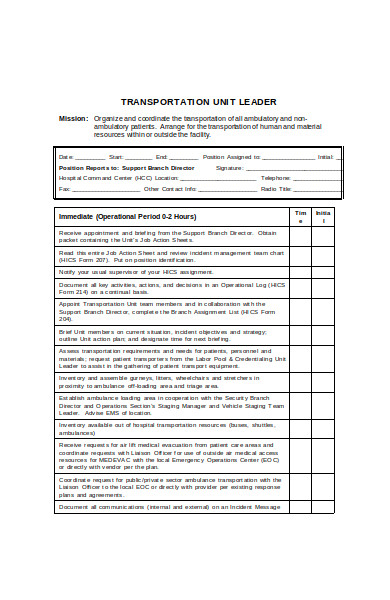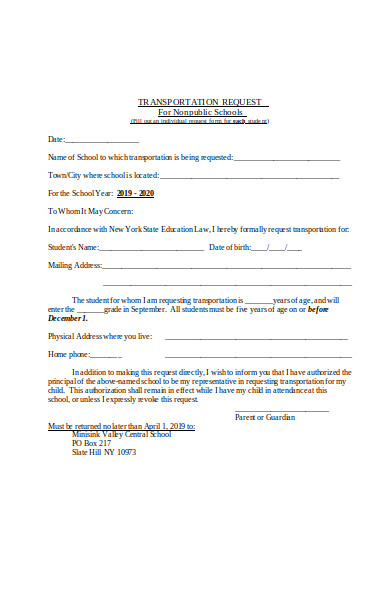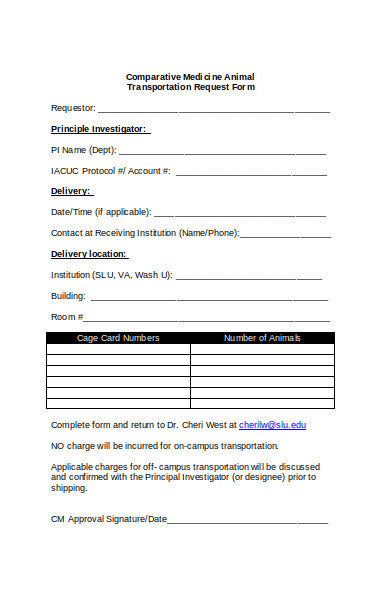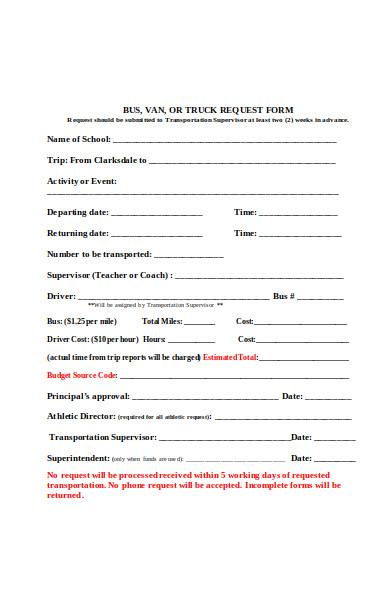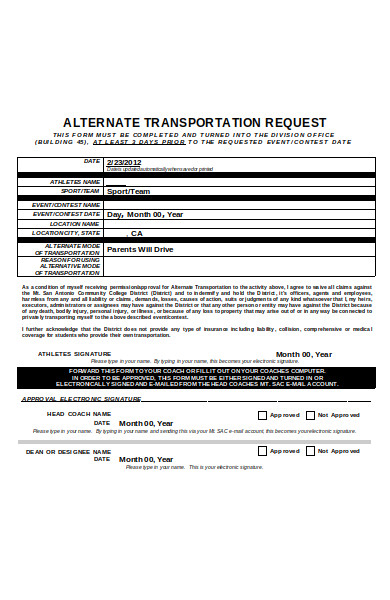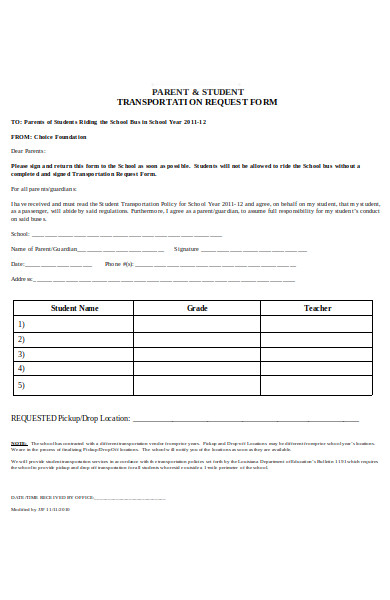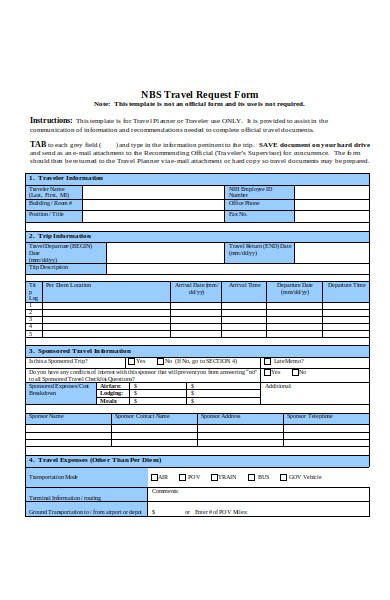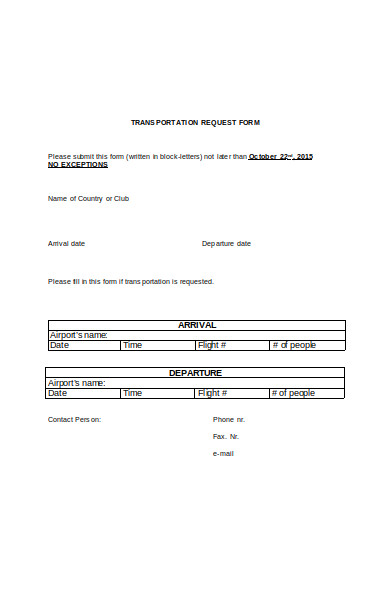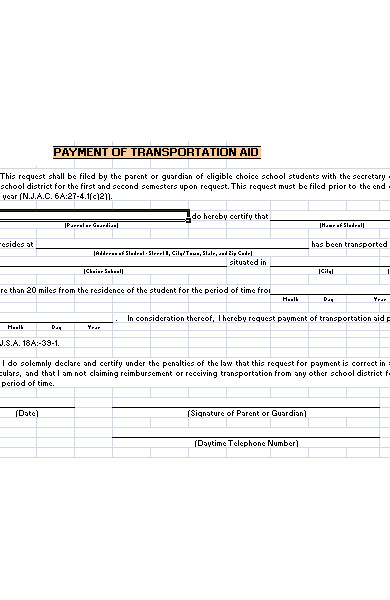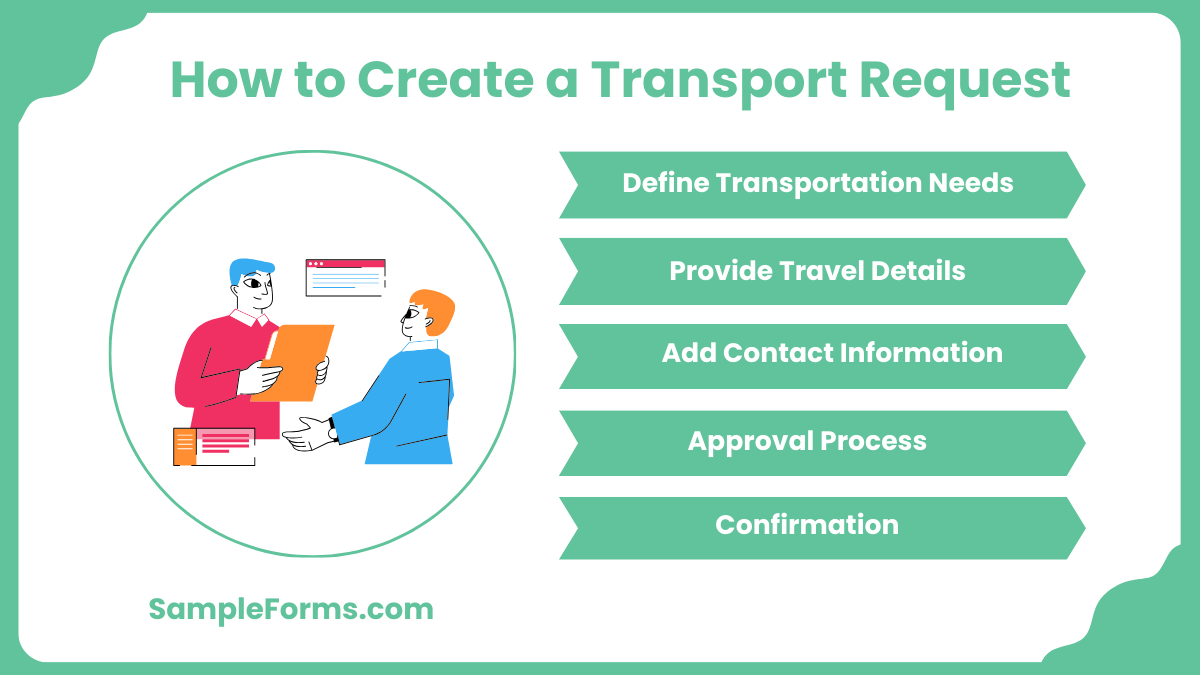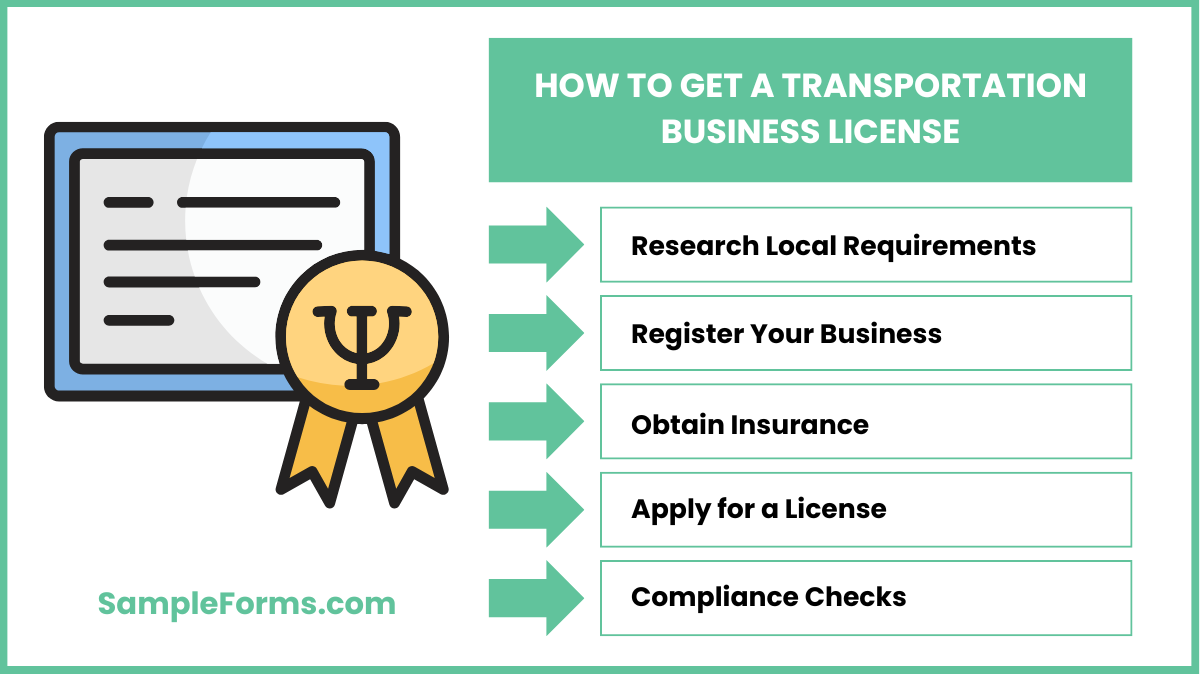A Transportation Request Form is essential for organizing and managing travel logistics in businesses, schools, or personal events. It streamlines the process of requesting transport services, detailing passenger information, travel dates, destinations, and special requirements. This guide covers various formats, from corporate travel to school trips, ensuring efficient resource allocation and cost control. Whether you’re coordinating employee shuttles, booking event transportation, or managing fleet services, the Request Form simplifies documentation, reduces errors, and enhances communication between departments. Explore our comprehensive examples, templates, and expert tips to create an effective transportation request process tailored to your needs.
Download Transportation Request Form Bundle
What is Transportation Request Form?
A Transportation Request Form is a document used to request transportation services, whether for business, school, or personal use. It typically includes details like the requester’s name, purpose of travel, date, destination, and vehicle requirements. This form helps organizations coordinate transportation efficiently, ensuring proper scheduling, resource allocation, and cost management. It’s commonly used by companies for employee travel, schools for field trips, and logistics teams to manage fleet operations. By standardizing transport requests, the form minimizes communication gaps and streamlines the approval process.
Transportation Request Format
Requester Information:
Full Name: ___________________________
Department/Organization: ___________________________
Contact Number: ___________________________
Date of Request: ___________________________
Trip Details:
Purpose of Trip: ___________________________
Destination Address: ___________________________
Date and Time of Departure: ___________________________
Date and Time of Return: ___________________________
Passenger Information:
Number of Passengers: ___________________________
Names of Passengers: ___________________________
Vehicle Requirements:
Type of Vehicle Needed: ___________________________
Special Requirements (if any): ___________________________
Approval Section:
Authorized By: ___________________________
Approval Date: ___________________________
Signature: ___________________________
Driver Assignment (Internal Use):
Driver’s Name: ___________________________
Vehicle Assigned: ___________________________
Confirmation Date: ___________________________
Transportation Request Form for School Bus
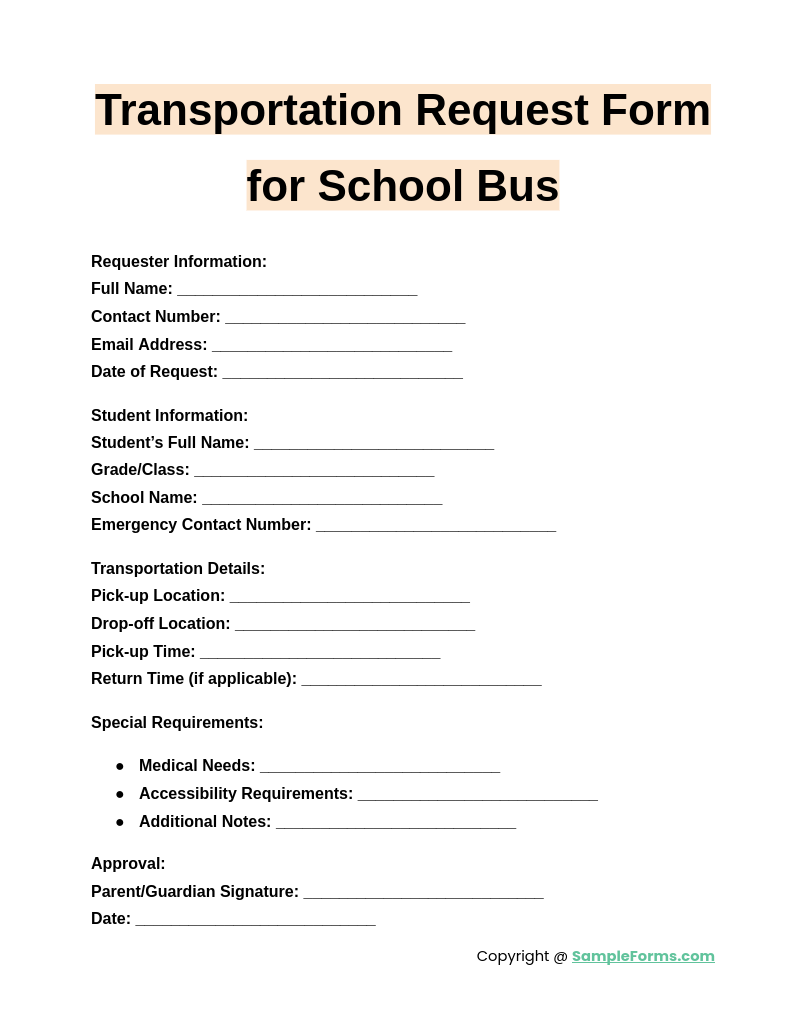
A Transportation Request Form for School Bus helps schools manage student transport efficiently. Similar to a Transportation Contract Form, it includes details like pick-up points, schedules, student information, and emergency contacts to ensure safe, organized travel.
Transportation Goods Request Form
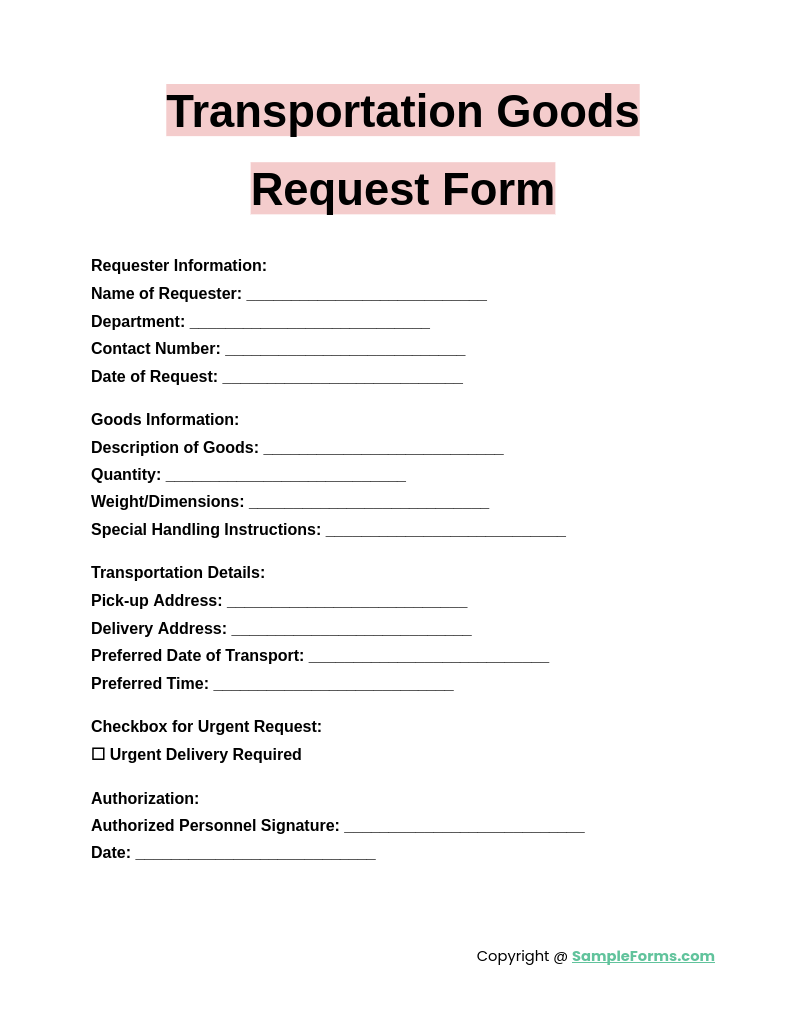
The Transportation Goods Request Form facilitates the movement of goods by detailing shipment contents, origin, destination, and delivery instructions. Like a Change Order Request Form, it tracks modifications in logistics, ensuring accurate, timely goods transportation.
Transportation Internal Request Form
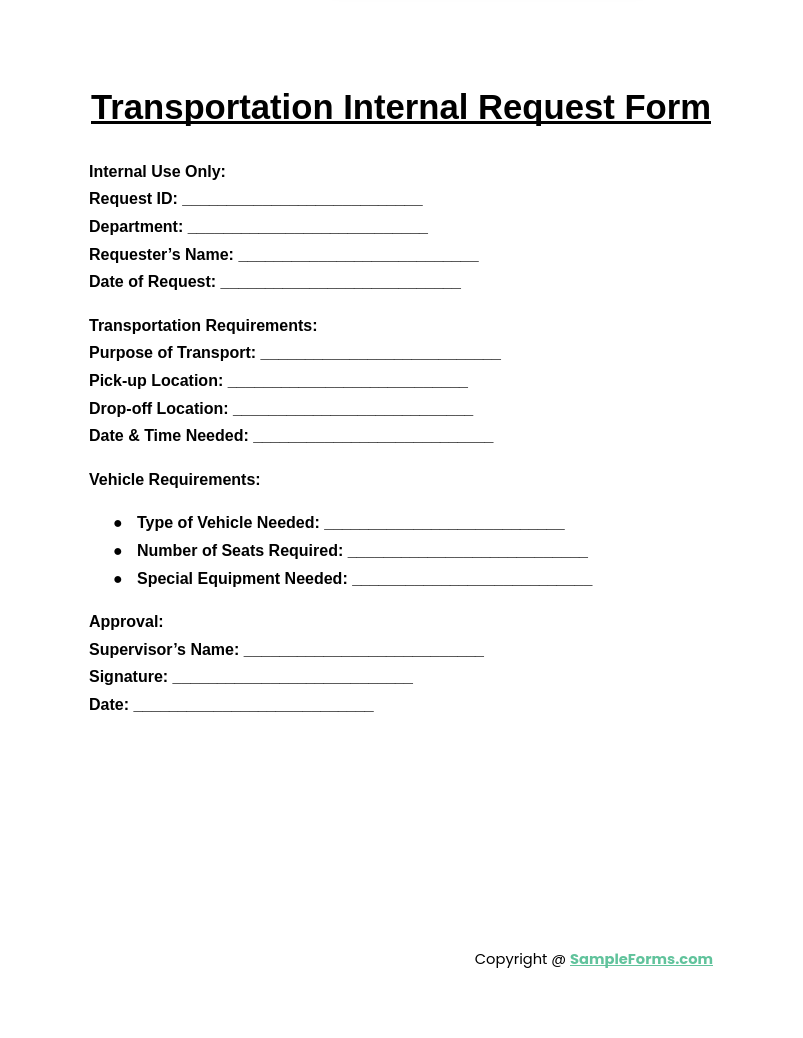
A Transportation Internal Request Form manages transport within organizations, specifying vehicle type, travel purpose, and employee details. It functions like a Purchase Request Form, streamlining internal operations for efficient scheduling and resource allocation.
Transportation Request Form for Students
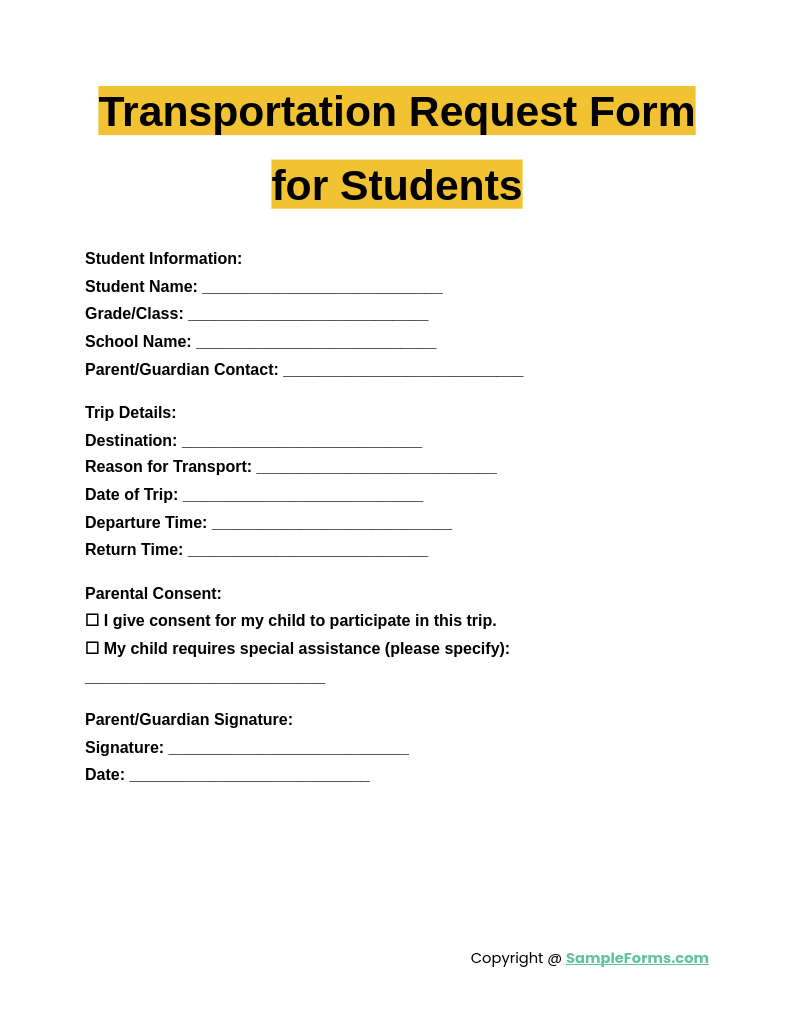
The Transportation Request Form for Students organizes student travel for academic events or field trips. It gathers information on destinations, chaperones, and special needs, akin to how a Prayer Request Form collects specific details for personalized attention.
Browse More Transportation Request Forms
1. Transportation Movement Request Form
2. Transportation Application Form
3. Trip Transportation Request Form
4. Transportation Childcare Request Form
5. Children Transportation Request Form
6. Student Transportation Request Form
7. New Transportation Request Form
8. Senior Services Transportation Request Form
9. Transportation Information Request Form
10. Non Emergent Transportation Request Form
11. Bus Transportation Transfer Request Form
12. Transportation Change Request Form
13. School Transportation Request Form
14. Transportation Request Form Sample
15. Transportation Request Policy Form
16. Client Transportation Request Form
17. General Transportation Request Form
18. Emergency Transportation Request Form
19. Vehicle Transportation Request Form
20. Medical Transportation Request Form
21. Transportation Exception Request Form
22. Transportation Service Request Form
23. Transportation Notice Request Form
24. Transportation Leader Request Form
25. Transportation Request for Non-Public School
26. Animal Transportation Request Form
27. Truck Transportation Request Form
28. Alternate Transportation Request Form
29. Parent Transportation Request Form
30. Travel Transportation Request Form
31. Standard Transportation Request Form
32. Transportation Payment Request Form
33. Transportation Approval Request Form
How to Create a Transport Request?
Creating a transport request involves specifying the type of transport, date, time, destination, and contact information. It streamlines logistics, similar to a Maintenance Request Form.
- Define Transportation Needs: Specify vehicle type, passenger count, or goods to be transported.
- Provide Travel Details: Include destination, departure time, and return schedule.
- Add Contact Information: List the requester’s name, phone number, and emergency contacts.
- Approval Process: Submit the form for managerial approval if required.
- Confirmation: Receive confirmation with assigned transport details.
How Do I Copy a Transport Request?
Copying a transport request ensures efficiency by duplicating previous details, much like a Refund Request Form replicates transaction data.
- Access Existing Request: Locate the original request in the system.
- Select Copy Option: Click the duplicate or copy button.
- Edit Details: Update dates, destinations, or passenger details as needed.
- Review for Accuracy: Ensure all new information is correct.
- Submit the Form: Finalize and submit for approval.
How Do I Start a Transportation Service?
Starting a transportation service requires planning, licensing, and operational setup, similar to organizing staff shifts with a Shift Change Request Form.
- Develop a Business Plan: Define services, target markets, and revenue goals.
- Register the Business: Obtain necessary licenses and permits.
- Acquire Vehicles: Purchase or lease suitable transport vehicles.
- Hire Staff: Recruit qualified drivers and support personnel.
- Marketing: Promote services to attract clients.
What Are the Types of Transport Request?
Transport requests vary based on purpose, cargo, or passenger requirements, much like different transaction types in a Payment Request Form.
- Passenger Transport Requests: For employee shuttles, school trips, or tours.
- Goods Transport Requests: For shipping products or materials.
- Emergency Transport Requests: For urgent deliveries or medical transportation.
- Internal Transport Requests: For company operations across departments.
- Event Transport Requests: For conferences or large gatherings.
How to Get a Transportation Business License?
Obtaining a transportation business license ensures legal compliance, similar to securing permissions with a Service Request Form.
- Research Local Requirements: Identify licensing needs in your area.
- Register Your Business: Complete business registration with government authorities.
- Obtain Insurance: Secure liability insurance for vehicles and operations.
- Apply for a License: Submit the necessary documents to transportation authorities.
- Compliance Checks: Pass inspections and meet regulatory standards.
What Does IEP Mean in Transportation?
IEP stands for Individualized Education Program, detailing transportation needs for students with disabilities. It ensures proper accommodations, similar to completing a Donation Request Form for specific assistance.
What Is a Travel Request?
A travel request is a formal document seeking approval for business or personal trips, outlining purpose, destination, and costs, much like a Testimonial Request Form gathers feedback.
What Is a Transportation Order?
A transportation order directs the movement of goods or people, specifying details like cargo, routes, and schedules, similar to organizing data in a Medical Records Request Form.
What Does Government Transportation Do?
Government transportation manages public transit systems, infrastructure, and regulations to ensure safe, efficient mobility, functioning like a Transcript Request Form that standardizes processes.
What Is the Meaning of Transportation Assistance?
Transportation assistance provides support for individuals needing help with travel arrangements, often through subsidies or services, like a Check Request Form facilitates financial aid.
How Do I Become a Transportation Provider?
To become a transportation provider, register your business, obtain licenses, and meet safety regulations, similar to submitting a Supply Request Form for operational needs.
What Is the Most Used Form of Transportation?
The most used form of transportation globally is road transport, including cars, buses, and trucks, vital for daily commutes, like a Change Request Form for administrative tasks.
Who Can Request a Travel Document?
Individuals traveling internationally can request travel documents like visas or passports, following procedures similar to completing a Purchase Order Request Form for approvals.
What Does ADA Mean in Transportation?
ADA refers to the Americans with Disabilities Act, ensuring accessible transportation for individuals with disabilities, much like a Reclassification Request Form addresses specific needs.
What Is an IEP in Trucking?
In trucking, IEP stands for Intermodal Equipment Provider, responsible for maintaining transportation equipment, functioning similarly to an Information Request Form for detailed data management.
In conclusion, a Transportation Request Form plays a vital role in managing travel logistics for businesses, educational institutions, and personal events. It ensures efficient coordination, clear communication, and proper documentation of transportation needs. Whether you’re handling corporate shuttles, school trips, or event logistics, using well-structured forms minimizes errors and enhances scheduling efficiency. Templates and examples make it easy to customize forms based on specific requirements. Additionally, integrating this process with tools like the Leave Request Form can improve overall workflow management, ensuring seamless operations and timely approvals.
Related Posts
-
FREE 25+ COVID-19 Self Quarantine Employee Leave Forms Download – How to Create Guide, Tips
-
FREE 6+ Business Credit Checklist Forms in PDF
-
FREE 4+ Uniform Commercial Code Forms in PDF
-
FREE 10+ Copy Request Forms in PDF | MS Word
-
FREE 8+ Budget Transfer Forms in PDF | Excel
-
FREE 14+ Schedule Adjustment Forms in PDF | MS Word
-
FREE 9+ Certification Request Forms in PDF | MS Word
-
FREE 6+ Credit Report Request Forms in PDF | MS Word
-
FREE 6+ IT Service Request Forms in PDF | MS Word
-
Testimonial Request Form
-
FREE 13+ Customer Request Forms in PDF | MS Word | Excel
-
FREE 11+ Holiday Request Forms in PDF | MS Word | Excel
-
Credit Report Dispute Letter
-
FREE 5+ Military Letter of Recommendation in PDF | MS Word
-
FREE 10+ Expense Request Forms in PDF | MS Word | Excel
